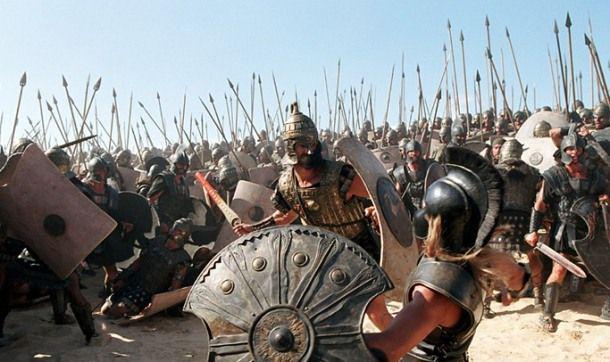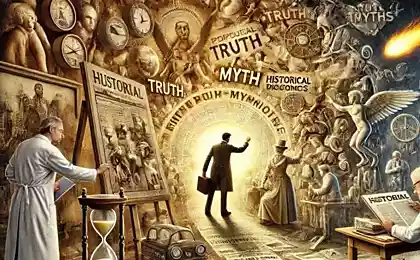811
Myths about the Ancient World
Many of our ideas of ancient Greece and the Roman Empire podcherpnut from movies, that is the source of "knowledge" may well be the imagination of Hollywood filmmakers. After all, they both thought: "That's all fine, but why not make the toga more sexy?»
Who will understand the order:

1. The Romans were obsessed with orgies

Myth
When we say "Roman" in response and asks "orgy"! Perhaps some will add "empire." It is also true, but for the good of this myth is "orgy." Heck, virtually everyone can see the Romans as a humanoid rabbits that breed anytime, anywhere. What is missing is the long ears and bulging eye-beads.
Reality
That is why it is impossible to study the history of films that put an erotic magazine Penthouse. It seems that all the dirty Roman history ended in gossip about the process has already taken place. In fact, the Romans were highly hypocrites, had sex only at night, and thus did not always take off their clothes. Of course, there were times when the Romans mated in front of the servants, but only because they did not consider them as human beings.
However, if the film Caligula so far from the truth, who still came up with the Roman orgies? The early Christians, that's who. Christian preachers understood that nothing disturbs the audience sanctimonious like the fact that someone somewhere has sex not like it. Thus, in order to promote the nascent religion among the Roman masses it was invented about duck dirty orgy.
Christian Marketing was: "Do you see those pagans with orgies and class inequality? And they take off their clothes during sex! Your name is Gross, right? Let me tell you about Jesus ... ". And something tells us that this scheme works.
2. The ancient Romans were white as lilies

Myth
If a person is asked to submit a full Roman Colosseum, the head is likely to be born with a picture of a sea of red hats. And what is under those helmets? Many brave white guys Caucasoid type.
Reality
Imagine the Roman Empire. Please note that many parts of the empire are in Africa or the Middle East.
Based only on this, we can say that the Roman Empire was a rather colorful mix of Semitic tribes, the peoples of North Africa, West Asia and Greece. And do not learn from the modern cinema.
Despite the fact that Hollywood refuses to admit it, Ancient Rome was a kind of melting pot. Then the color of the skin did not cause prejudice, not like now. In Rome it was even two African Emperor Severus Makrinus. Rome was a unique state in the ancient world. In the past, the city-state, Sparta, conquered, enslaved or killed people. Rome radically different from them. Winners are not conquered peoples were forced to abandon their own languages and customs. For the Romans, it was mainly people to pay taxes, abide by the law and, of course, served in the Roman army.
Old little Rome could never have spread to such a large territory, and, especially, to protect them. However, the Romans found a way out: they absorbed other peoples and used for their own purposes. When the Romans conquered Britain, they were sent to all who could wield a sword or throw a spear: Moors, Celts, Gauls, Jews.
So Roman get-together was more like a multinational crowd, not the slender rows of white Aryans.
3. Christians were fed to the lions in the arena of the Colosseum

Myth
Whenever the Romans needed the spectacle and cannon fodder for the gladiators or large cats, they just drove another group of Christians. Book a place now to bring children!
Reality
In fact, there is no official record about the martyrdom of Christians in the Coliseum. Moreover, Christianity became the official religion of Rome. None of the lion in the Coliseum is not picking his teeth bones of believers. When Emperor Nero persecuted the early Christians for the burning, the Coliseum has not even happened! It was built decades later, and by that time Rome has returned to its standard policy, "Jesus, Lord Zeus - yes anyone, most importantly, what to pay taxes».
However, there is a crowd of martyrs, saints and apostles, who were eaten by lions and burned at the stake, in order to calm the crowd Coliseum! Where they went, these tales? Get ready for a sense of deja vu, the answer is simple and short: the early Christians.
In the second century AD, a new genre of fiction. "Acts of the Martyrs," told the story about the origins of the Church, about the brave men and women who, in spite of the terrible suffering and torture, continued to practice their faith. In the Roman Empire, this book was popular as Harry Potter today. The Acts of the martyrs tell how good and pure Christian beheaded Roman officials. These Acts meet the needs of just two of the early Christians: first, they got a book full of heroes of love and forgiveness, and secondly, have received confirmation of literary cruelty of the Romans.
However, we must be grateful to the guys who wrote this great historical work. Since the eighteenth century, various popes have used these false historical evidence in order to prevent the destruction of the Coliseum. It is referred to the places sanctified by the blood of martyrs.
4. The ancient Olympic Games were devoted to the inspection of physical abilities, but not advertising and glory

Myth
Of course, now the Olympics are corrupt, are filled with deceit and peppered with scandals, but at least they tend to the noble ideals of the ancient Greeks, fair play and peace. It's really inspiring.
Reality
In fact, all the worst aspects of the modern game, including fraud, corruption and commercialization existed even in ancient times, the Olympic Games. The ancient Greeks even words do not support the spirit of sportsmanship, for the idea of "fair play" in principle does not exist.
The terms "for the love of the game" did not exist two thousand years ago. Ancient Greek athletes were equally motivated by material gain and glory, as well as modern. Heck, even the word competitor means "compete for the prize»!
Technically, the winners received only an olive wreath, but the athlete brought a wreath at home, showered his wealth and women. Athens Olympic champions paid fortunes. Common to Olympians were pensions, free meals for the rest of massive and ownership. Popular winners were paying a lot of money for public appearances. Great athletes can earn for one way a hundred times more than men for the year.
Of course, for the political situation, wealth, fame, personal articles and fame fought by any means. Athletes have tried different spells, herbs, potions, oils and alcohol. The Art of Deception has risen to unprecedented heights, because if you notice, the penalty could be quite different: from the flogging and ending with death. Despite the risks, the athletes bribed judges and competitors.
At mene, in ancient times did not change the host city, which means, on this occasion there were no scandals. Ancient fought for control of the city host for the right to submit their barbecues and poorly made souvenirs.
5. Ancient Greece was a stronghold of progress and reason

Myth
As long as the Roman Empire conquered Greece, where the rules of the world, reason, logic and rules of courtesy. Lovers of the night to drink beer might encounter with Plato or Aristotle in the same queue. The whole country was a sweet dream humanities. Indeed, this era was the golden age of mankind.
Reality
Ancient Greece was full of warring factions. This does not mean that in Greece there were no outstanding personalities, but the most striking and eye-catching and could lynch. Remember Socrates, yes?
As you can see, Greece did not exist as such, many have not even heard of the word "Greece". The whole area is composed of thousands of city-states. And everyone thought his home city, and not his country. In addition, each group had its own army, its own customs and religion. Oh, and, of course, they all had slaves. All this talk about democracy, freedom and lofty ideas did not prevent enslave his neighbor. Of course, some philosophers have preached that slavery is not good that we are all brothers, but then they just enslaved any Sparta or Thessaly.
A freedom-loving and democratic Athens slaves was greater than anywhere else. Note, democracy in Athens lasted less than two centuries. Almost every ancient thinking mind wanted to return to tyranny or any other form of government, but would not be democratic.
Thus, philosophical, and cultural achievements of ancient Greece is not too eager to spread. Permanent war and rivalry between the city-states was only one reason. Need more? Diploma owned less than five percent of the population of ancient Greece. Most were illiterate rural farmers who did not go even beyond the city. The number of urban intellectuals, too, is clearly overestimated our imagination.
Who will understand the order:

1. The Romans were obsessed with orgies

Myth
When we say "Roman" in response and asks "orgy"! Perhaps some will add "empire." It is also true, but for the good of this myth is "orgy." Heck, virtually everyone can see the Romans as a humanoid rabbits that breed anytime, anywhere. What is missing is the long ears and bulging eye-beads.
Reality
That is why it is impossible to study the history of films that put an erotic magazine Penthouse. It seems that all the dirty Roman history ended in gossip about the process has already taken place. In fact, the Romans were highly hypocrites, had sex only at night, and thus did not always take off their clothes. Of course, there were times when the Romans mated in front of the servants, but only because they did not consider them as human beings.
However, if the film Caligula so far from the truth, who still came up with the Roman orgies? The early Christians, that's who. Christian preachers understood that nothing disturbs the audience sanctimonious like the fact that someone somewhere has sex not like it. Thus, in order to promote the nascent religion among the Roman masses it was invented about duck dirty orgy.
Christian Marketing was: "Do you see those pagans with orgies and class inequality? And they take off their clothes during sex! Your name is Gross, right? Let me tell you about Jesus ... ". And something tells us that this scheme works.
2. The ancient Romans were white as lilies

Myth
If a person is asked to submit a full Roman Colosseum, the head is likely to be born with a picture of a sea of red hats. And what is under those helmets? Many brave white guys Caucasoid type.
Reality
Imagine the Roman Empire. Please note that many parts of the empire are in Africa or the Middle East.
Based only on this, we can say that the Roman Empire was a rather colorful mix of Semitic tribes, the peoples of North Africa, West Asia and Greece. And do not learn from the modern cinema.
Despite the fact that Hollywood refuses to admit it, Ancient Rome was a kind of melting pot. Then the color of the skin did not cause prejudice, not like now. In Rome it was even two African Emperor Severus Makrinus. Rome was a unique state in the ancient world. In the past, the city-state, Sparta, conquered, enslaved or killed people. Rome radically different from them. Winners are not conquered peoples were forced to abandon their own languages and customs. For the Romans, it was mainly people to pay taxes, abide by the law and, of course, served in the Roman army.
Old little Rome could never have spread to such a large territory, and, especially, to protect them. However, the Romans found a way out: they absorbed other peoples and used for their own purposes. When the Romans conquered Britain, they were sent to all who could wield a sword or throw a spear: Moors, Celts, Gauls, Jews.
So Roman get-together was more like a multinational crowd, not the slender rows of white Aryans.
3. Christians were fed to the lions in the arena of the Colosseum

Myth
Whenever the Romans needed the spectacle and cannon fodder for the gladiators or large cats, they just drove another group of Christians. Book a place now to bring children!
Reality
In fact, there is no official record about the martyrdom of Christians in the Coliseum. Moreover, Christianity became the official religion of Rome. None of the lion in the Coliseum is not picking his teeth bones of believers. When Emperor Nero persecuted the early Christians for the burning, the Coliseum has not even happened! It was built decades later, and by that time Rome has returned to its standard policy, "Jesus, Lord Zeus - yes anyone, most importantly, what to pay taxes».
However, there is a crowd of martyrs, saints and apostles, who were eaten by lions and burned at the stake, in order to calm the crowd Coliseum! Where they went, these tales? Get ready for a sense of deja vu, the answer is simple and short: the early Christians.
In the second century AD, a new genre of fiction. "Acts of the Martyrs," told the story about the origins of the Church, about the brave men and women who, in spite of the terrible suffering and torture, continued to practice their faith. In the Roman Empire, this book was popular as Harry Potter today. The Acts of the martyrs tell how good and pure Christian beheaded Roman officials. These Acts meet the needs of just two of the early Christians: first, they got a book full of heroes of love and forgiveness, and secondly, have received confirmation of literary cruelty of the Romans.
However, we must be grateful to the guys who wrote this great historical work. Since the eighteenth century, various popes have used these false historical evidence in order to prevent the destruction of the Coliseum. It is referred to the places sanctified by the blood of martyrs.
4. The ancient Olympic Games were devoted to the inspection of physical abilities, but not advertising and glory

Myth
Of course, now the Olympics are corrupt, are filled with deceit and peppered with scandals, but at least they tend to the noble ideals of the ancient Greeks, fair play and peace. It's really inspiring.
Reality
In fact, all the worst aspects of the modern game, including fraud, corruption and commercialization existed even in ancient times, the Olympic Games. The ancient Greeks even words do not support the spirit of sportsmanship, for the idea of "fair play" in principle does not exist.
The terms "for the love of the game" did not exist two thousand years ago. Ancient Greek athletes were equally motivated by material gain and glory, as well as modern. Heck, even the word competitor means "compete for the prize»!
Technically, the winners received only an olive wreath, but the athlete brought a wreath at home, showered his wealth and women. Athens Olympic champions paid fortunes. Common to Olympians were pensions, free meals for the rest of massive and ownership. Popular winners were paying a lot of money for public appearances. Great athletes can earn for one way a hundred times more than men for the year.
Of course, for the political situation, wealth, fame, personal articles and fame fought by any means. Athletes have tried different spells, herbs, potions, oils and alcohol. The Art of Deception has risen to unprecedented heights, because if you notice, the penalty could be quite different: from the flogging and ending with death. Despite the risks, the athletes bribed judges and competitors.
At mene, in ancient times did not change the host city, which means, on this occasion there were no scandals. Ancient fought for control of the city host for the right to submit their barbecues and poorly made souvenirs.
5. Ancient Greece was a stronghold of progress and reason

Myth
As long as the Roman Empire conquered Greece, where the rules of the world, reason, logic and rules of courtesy. Lovers of the night to drink beer might encounter with Plato or Aristotle in the same queue. The whole country was a sweet dream humanities. Indeed, this era was the golden age of mankind.
Reality
Ancient Greece was full of warring factions. This does not mean that in Greece there were no outstanding personalities, but the most striking and eye-catching and could lynch. Remember Socrates, yes?
As you can see, Greece did not exist as such, many have not even heard of the word "Greece". The whole area is composed of thousands of city-states. And everyone thought his home city, and not his country. In addition, each group had its own army, its own customs and religion. Oh, and, of course, they all had slaves. All this talk about democracy, freedom and lofty ideas did not prevent enslave his neighbor. Of course, some philosophers have preached that slavery is not good that we are all brothers, but then they just enslaved any Sparta or Thessaly.
A freedom-loving and democratic Athens slaves was greater than anywhere else. Note, democracy in Athens lasted less than two centuries. Almost every ancient thinking mind wanted to return to tyranny or any other form of government, but would not be democratic.
Thus, philosophical, and cultural achievements of ancient Greece is not too eager to spread. Permanent war and rivalry between the city-states was only one reason. Need more? Diploma owned less than five percent of the population of ancient Greece. Most were illiterate rural farmers who did not go even beyond the city. The number of urban intellectuals, too, is clearly overestimated our imagination.





















